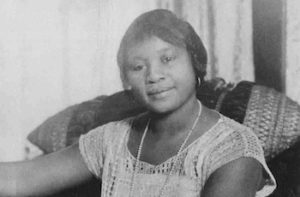
Sarah Rector
*Sarah Rector was born on March 3, 1902. She was a Black entertainer and businesswoman. Sarah Rector was born near the all-black town of Taft, Oklahoma, in Indian Territory.
She had five siblings. Her parents, Rose McQueen, and her husband, Joseph Rector, were descendants of African people who had been slaves owned by the Muscogee Creek Nation Creek Indians before the American Civil War and which became part of the Muscogee Creek Nation after the Treaty of 1866. As such, they and their descendants were listed as freedmen on the Dawes Rolls, by which they were entitled to land allotments under the Treaty of 1866 made by the United States with the Five Civilized Tribes. Consequently, nearly 600 black children, or Muscogee Freedmen minors as they were called, were granted land allotments, and Sarah Rector was allotted 159.14 acres (64 hectares).
This was a mandatory step in integrating the Indian Territory with Oklahoma Territory to form the State of Oklahoma. Sarah's father was the son of John Rector, a Muscogee Freedman. John Rector’s father, Benjamin McQueen, was enslaved by Reilly Grayson, a Muscogee Creek Indian. John Rector's mother, Mollie McQueen, was enslaved by Muscogee leader Opothole Yahola, who fought in the Seminole wars and split with the tribe, moving his followers to Kansas.
The parcel allotted to Sarah Rector was located in Glenpool, 60 miles (97 km) from where she and her family lived. It was considered inferior infertile soil, unsuitable for farming, and better land was reserved for white settlers and tribe members. The family lived but not in poverty; however, the $30 annual property tax on Sarah's parcel was such a burden that her father petitioned the Muskogee County Court to sell the land. His petition was denied because of certain restrictions placed on the land, so he was required to continue paying the taxes.
To help cover this expense, in February 1911, Joseph Rector leased Sarah's parcel to the Standard Oil Company. In 1913, the independent oil driller B.B. Jones drilled a well on the property, producing a "gusher" that began bringing in 2,500 barrels (400 m3) of oil daily. Rector began to receive a daily income of $300 from this strike. The law at the time required full-blooded Indians, black adults, and children who were citizens of Indian Territory with significant property and money to be assigned "well-respected" white guardians. Thus, as soon as Rector began to receive this windfall, there was pressure to change Rector's guardianship from her parents to that of a local white resident named T.J. (or J.T.) Porter is an individual known to the family. Rector's allotment subsequently became part of the Cushing-Drumright Oil Field.
In October 1913, Rector received royalties of $11,567. As news of Rector's wealth spread worldwide, she began receiving requests for loans, money gifts, and marriage proposals, although she was only 12. Given her wealth, in 1913, the Oklahoma Legislature made an effort to have her declared white, allowing Rector to reap the benefits of her elevated social standing, such as riding in a first-class car on the trains. In 1914, The Chicago Defender began to take an interest in Rector, just as rumors began to fly that she was a white immigrant who was being kept in poverty.
The newspaper published an article claiming that her family was mismanaging her estate, that she was uneducated, and had a poor quality of life. This caused Black leaders Booker T. Washington and W. E. B. DuBois to become concerned about her welfare. In June of that year, a special agent for the National Association for the Advancement of Colored People (NAACP), James C. Waters Jr, sent a memo to Dubois regarding her situation. Waters had been corresponding with the Bureau of Indian Affairs and the United States Children's Bureau over concerns regarding the mismanagement of the Rector estate. He wrote of her white financial guardian:
Is it not possible to have her cared for in a decent manner and by people of her own race instead of by a member of a race which would deny her and her kind the treatment accorded a good yard dog? This prompted Dubois to establish the Children's Department of the NAACP, which would investigate claims of white guardians suspected of depriving black children of their land and wealth. Washington also intervened to help the Rector family.
In October of that year, she was enrolled in the Children's School, a boarding school at the Tuskegee Institute. Upon graduation, she attended the Institute. Rector was already a millionaire by the time she had turned 18. She owned stocks, bonds, a boarding house, businesses, and a 2,000-acre piece of prime river bottomland. At that point, she left Tuskegee and, with her entire family, moved to Kansas City, Missouri. Soon after, she married a local man, Kenneth Campbell. The wedding was private, with only her mother and the bridegroom's paternal grandmother present. The couple had three sons before divorcing in 1930. She purchased a house on 12th Street that is still there, known as the Rector House. A local nonprofit purchased the home to restore it and preserve its historical and cultural heritage. Later life
Rector lived a comfortable life, enjoying her wealth. She had a taste for fine clothing and cars. She had lavish parties, entertaining celebrities such as Count Basie and Duke Ellington. Sarah Rector died on July 22, 1967, at age 65. Her remains were buried in the city cemetery of her hometown of Taft.